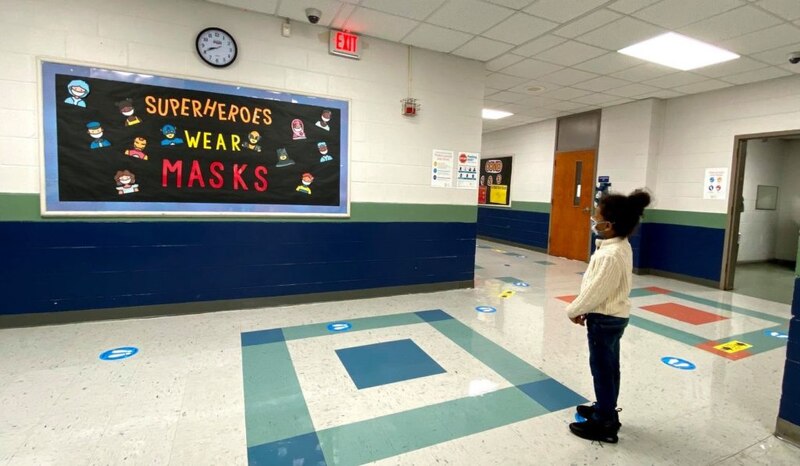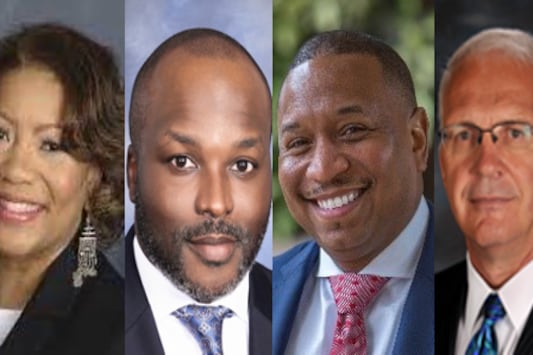The leaders of Tennessee’s four largest school districts asked lawmakers Tuesday to keep funding intact for education, raise teacher pay, and invest more in student mental health as the coronavirus pandemic tests school communities in unprecedented ways.
They also talked about the need to accelerate vaccinations against the virus and praised Gov. Bill Lee’s administration for bumping up teachers and school staff on the state’s priority list for shots.
In addition, Shelby County Schools Superintendent Joris Ray lauded the state for its newly released plan to invest $100 million of one-time federal funding in early literacy programs.
“Literacy is life,” said Ray, noting that just one in four students in his Memphis district are reading on grade level. “If our students can’t read by the time they’re in third grade, we are in big trouble.”
Ray and his counterparts in Nashville, Knoxville, and Chattanooga appeared virtually for an hourlong panel discussion with members of the House Democratic Caucus ahead of this year’s legislative session. The General Assembly is scheduled to organize next week and reconvene on Jan. 19 for a special session called by the governor to focus on education issues.
Tuesday’s discussion marked the first time during the COVID-19 crisis that all four urban superintendents were asked to weigh in collectively and publicly with lawmakers about their challenges and needs, albeit with members of the legislature’s minority party. Although they oversee more than a fourth of the state’s nearly 1 million public school students, none of the urban leaders were among the six superintendents invited to testify in September when the GOP-led House Education Committee met to discuss learning loss during the pandemic.
“It’s been a year like no other,” said Bryan Johnson, superintendent of Hamilton County Schools in Chattanooga. “I’d love to paint it rosy, but it’s been difficult.”
Superintendents described how their school systems have tailored learning models to their local populations and community spread of the virus. Schools in Knoxville and Chattanooga have provided more in-person instruction, followed by those in Nashville. The state’s largest district in Memphis, where spread of the virus is highest, continues to operate virtually.
“Our schools are completely connected to our communities,” said Adrienne Battle, director of Metropolitan Nashville Public Schools. “Our goal here, and I know across the state, is to bring students back for in-person instruction as soon as possible when it is safe to do so.”

Reflecting national trends, the vast majority of Tennessee’s 147 school districts have experienced dips in enrollment this academic year. Most of Tennessee’s declines stem from families who shifted to homeschooling or private schools or held back students due to start kindergarten, according to Education Commissioner Penny Schwinn.
Superintendents are concerned that the enrollment drop could put hundreds of millions of dollars at risk in next year’s state budget for education, since enrollment from the current school year sets per-pupil funding levels for the next one. Early statewide data shows about 33,000 fewer students started public school in the fall, which normally would decrease Tennessee’s allocation for public education by at least $320 million.
“If we can just make sure that we continue to be funded based on the [enrollment] from last year – in other words, hold us harmless – that would be extremely helpful,” said Superintendent Bob Thomas. He gave a long list of new pandemic-related expenses for Knox County Schools and added that virtual learning options “are here to stay,” even when the pandemic ends, requiring more funding.
Thomas and Ray also asked for more money for teacher pay, as all four superintendents described educators adapting to the pandemic to teach virtually, in person, and sometimes both.
“Teachers and leaders and support staff have been absolutely remarkable and heroic in regards to what we’ve asked them to do,” added Johnson, who recently recovered from his own bout with COVID-19.
School funding and teacher pay are among five key education issues to be taken up during the special session. Legislative leaders have indicated they’re likely to keep funding intact as more students are expected to return to public schools next year. And the governor has said he’d like to boost teacher salaries too if possible, after rolling back a planned 4% hike last year as the economy sputtered.
But new investments in student mental health are less certain. That need did not make Gov. Lee’s list of education priorities to be discussed during the special session, even as superintendents have asked for more counselors, social workers, and other mental health professionals due to the pandemic’s heavy emotional toll.
“We’re trying to do as much as we can to make this as normal as we possibly can in a very abnormal situation for our students and our teachers,” said Knox County’s Thomas.
Last year, before the pandemic emerged, the governor proposed creating a $250 million trust fund to support and grow mental health services for students in Tennessee’s highest-risk schools. But that proposal was quickly scuttled after the pandemic hit.
Other issues slated to go before lawmakers during their special session are literacy, learning loss, and policies designed to hold students, teachers, and schools accountable for their performance.








